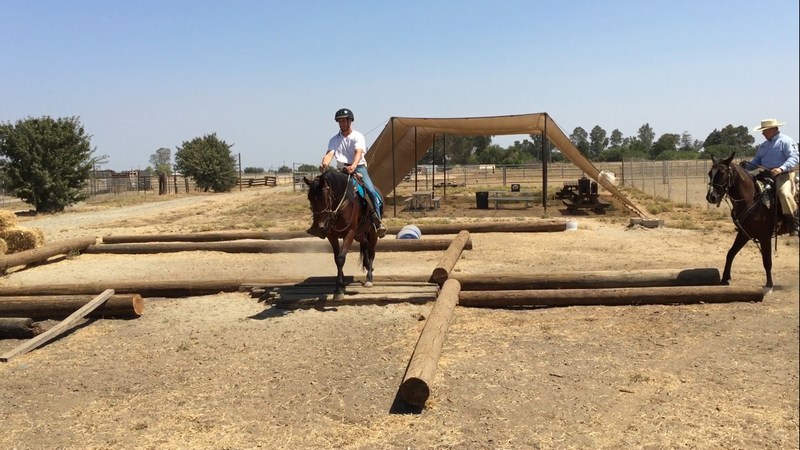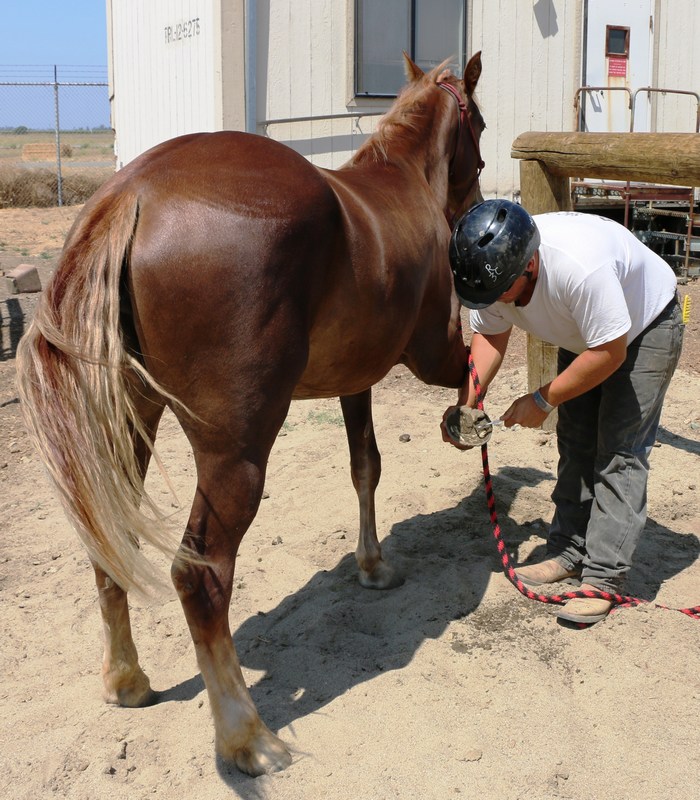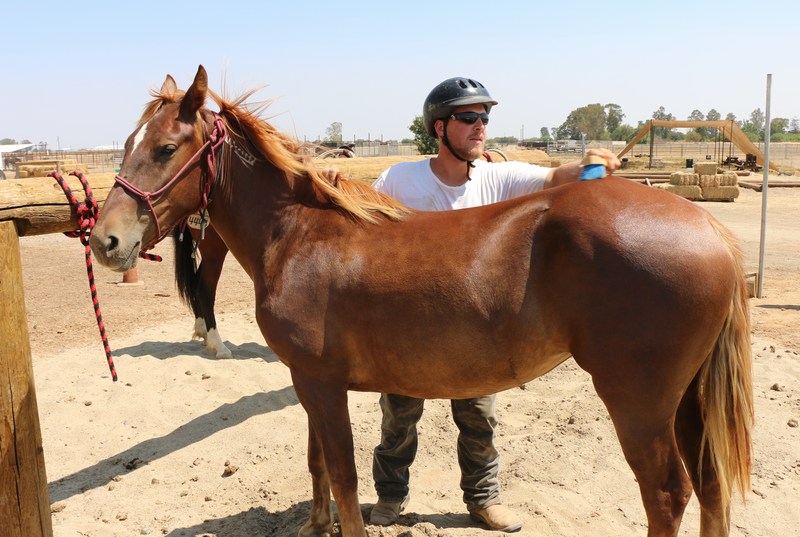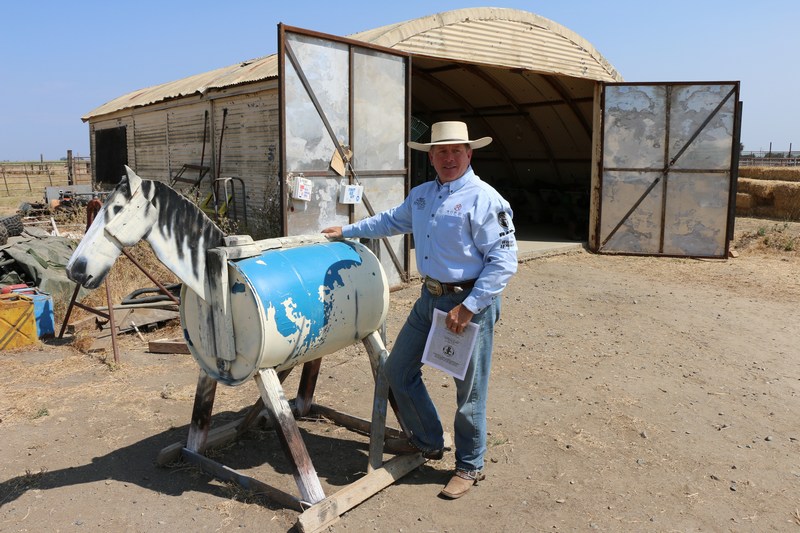Wild Horse Redemption in Sacramento County
 |
At a rustic ranch in rural Sacramento County patient wranglers learn to coax the wildness out of mustangs, while hoping the animals will one day flourish outside of the corrals that have held them since capture. These men persuading skittish horses to trust and connect, be petted and curried, haltered and ridden have a similar dream for themselves. They are AB 109 offenders in the final stretches of their sentences in Sacramento County’s Rio Consumnes Correctional Center. There the federal Bureau of Land Management has partnered in a unique jail training program designed to give a second chance to both these animals who have been rounded up on the range and the inmates chosen to calm them from among the jail’s cognitive behavioral therapy program standouts. “What’s that saying?” Nash Dake asked rhetorically as he brushed the back of a chestnut filly named Big Valley, ‘The outside of a horse does a lot for the inside of a man.’ That’s true. The horses have taught me what it’s like to be human, for real.”
Horses often are used as therapy conduits in everything from breaking down PTSD to building confidence in people with learning disabilities. These animals, whose only defense from danger is to flee, constantly monitor for threats and shy away when they sense impatience, anger and frustration in human handlers. “We want to give them soft working skills. We also get the other skills of compassion, empathy and sensitivity that they won’t get from a lot of other evidence-based curriculums,” said Sgt. Brad Rose, the Sacramento County Sheriff Department’s reentry coordinator. “They take ownership not just in the animal, but in their own development as well, and that’s important to us. We want them to have an acceptable level of compassion and sincerity. It helps prepare them for success post-release.” With so much focus on evidence-based programming in jails, Rose fears some institutions may overlook simple solutions that complement those classroom teachings. The reentry and programming deputies were looking at other states in search of successful, innovative programs when they learned of the BLM’s partnerships with western prisons. A former jail commander who had been a part of the department’s mounted unit approached the BLM, which is holding as many as 50,000 wild mustangs and burros who need socialization to make them adoptable. At the time the feds were looking for a new site to replace the defunct CDCR program at Susanville. “It’s hard to get people who don’t know horses to understand the intangible benefits that working with them offers,” said Amy Dumas, the BLM’s Wild Horse and Burro Program Manager in California. “The life skills. The humility and respect. They take lessons from these horses.”
 |
Sacramento sheriff’s officials traveled to the Nevada Department of Corrections in Carson City to evaluate the program there and liked what they saw. Theirs is now the only mustang program in the US housed in a county jail, though five western states have programs in state prisons. “If everything had to be evidence based, the forward-thinkers and innovators in offender programming who come up with programs like this would never be able to have them take root and grow,” Rose said. “We need to develop a variety of ways to meet the needs of each individual.” Dumas said that she is working with psychologists who want to study the mental health benefits offenders receive by participating in the horse programs. She said that the Nevada program has reduced recidivism to 15 percent from 25 percent, a figure sustained for five years. The BLM provided an $80,000 grant to start the program, part of which goes toward the salary of the Rio Consumnes ranch manager Joe Misner, a horse trainer who has competed in the Extreme Mustang Makeover since 2007 and won the prestigious title in 2014.
 |
“I get to work with wild horses, and for me it’s a big fulfillment to see the transformation from wild to being a successful part of society,” Misner said. “To take a person that has been discounted because of mistakes and help them move on with their life, well I can’t believe I get that opportunity.” Offenders at the jail built the corrals, and an outbuilding was repurposed for a tack barn. Eighteen months ago the BLM delivered the first of two dozen horses. Since that time not one offender who has worked with horses had been arrested again. “Even if we slow it down,” Rose said of the recidivism rate, “that’s something. But I think it’s going to be better than that.” The public response to the program has been overwhelming. The Napa Valley Horsemen’s Association recently held a tack drive to fill the jail’s barn, and Mustangs of America donated 25 saddles. Others have given old boots and protective riding helmets. The Gold Country Horsemen’s Association was collecting tack and cash to help the program build a covered arena. “Thanks for all you do for the mustangs and the guys trying to turn their lives around,” one horse lover wrote to Misner. The offenders who participate find themselves learning more than they had imagined.
 |
Dake discovered he has an instinct for animals and hopes to find a job working with horses when he’s released after serving a yearlong sentence for possession of a stolen vehicle, a result of meth addiction. “Horses live for what’s going on right now,” Dake said. “They are in the now. That’s all they know, and there’s a lot to learn from these guys. They aren’t worried about the element of time, and they’ve taught me not to worry about that element of time, and it has made my sentence here a lot less intense. I look forward to this every day. I teach them something new and they teach me something new.” The guys get bucked and dumped on their way to becoming certified mustang trainers. But it’s what happens inside of them that they choose to talk about. “I had the classes in jail, but I didn’t get my ‘aha’ moments until I was out here working with these horses and having to catch myself, my emotions,” said Harley Elyko, a two-timer who fueled his meth addition by stealing cars. He is proud to have been accepted into rehab at the Delancey Street Foundation in San Francisco upon release.
 |
“Now when I get outside this gate am I going to take that moment and catch myself? I can’t really answer that right now. Hopefully it still applies and I catch myself, take that breather and take a better route, a calmer route.” In late August Misner took six horses to the Murieta Mule Classic, where all were adopted to good homes. The men were sad knowing they would miss the animals for which they had developed such affection, but optimistic that a better life lies ahead. For all. “They are going somewhere that that will be a lot better for them,” Dake said. “They are going to be content, and that is what my best wishes are for them. And for me.”

